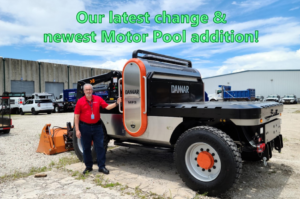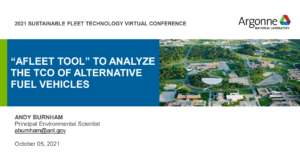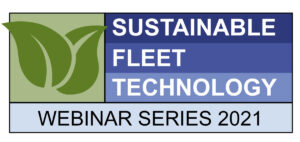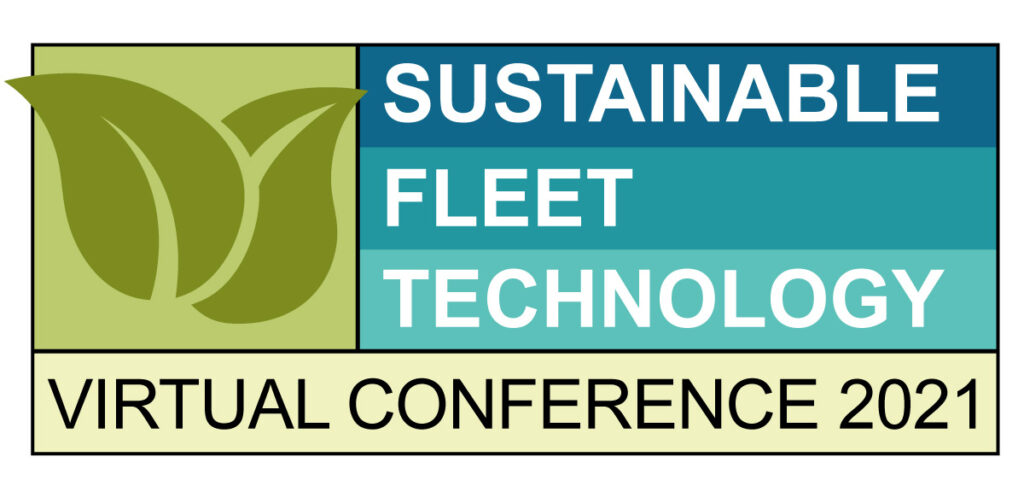Eleven FREE Sessions from the 2021 Sustainable Fleet Technology Virtual Conference Available to Stream Online
The North Carolina Clean Energy Technology Center recently concluded the 2021 Sustainable Fleet Technology Virtual Conference featuring the latest and greatest in sustainable fleet technology, operations and implementation. The conference consisted of 11 free webinars on best practices to make fleets run more efficiently, with valuable presentations and conversations from award-winning speakers from the industry.
All webinar recordings and resources are available to stream online now so you can access on-demand knowledge and expertise from fleet managers across the country. In total, there were 900 registered attendees for the 2021 Sustainable Fleet Technology (SFT 2021) Virtual Conference webinar sessions.
The SFT Conference is an annual event hosted by the Clean Transportation program at the NC Clean Energy Technology Center (NCCETC) to share strategies for achieving fleet sustainability from experts in the private and public sector. Fleet managers and clean technology innovators gather to discuss lessons learned across the industry for implementing and integrating innovative clean transportation technologies and alternative fuel operations, including the implementation in the biofuels, electric, natural gas, hydrogen and propane arenas.
Director of NCCETC’s Clean Transportation program, Richard Sapienza, surveyed fleet managers to find relevant session topics to highlight the current technologies, topics and issues impacting today’s fleet industry. “We want to build a community where ideas can be exchanged and we can provide support and strategies for dealing with new technologies to drive efficiency in fleets,” Sapienza said in the first session of SFT 2021.
The Future of Fleet Electrification
SFT 2021 kicked off on September 9 with “Electric Vehicle Infrastructure Planning Best Practices and Considerations for Today and the Future” showcasing effective planning and modeling along with real-world use cases to support an electrified future for different use cases . Currently, public and private fleets across the country are preparing for the electric vehicle (EV) revolution and, while significant consumer adoption is forecasted, transitioning entire fleets away from conventional fuel vehicles is a much more complex process than individuals going electric.
 Attendees of the webinar heard from a panel of experts including David Dunn, Division Manager of the Fleet & Facilities management Division for the City of Orlando, Florida. Dunn emphasized the critical roles public fleets have in leading the EV revolution and being the agent of change, from installation and maintenance of infrastructure to creating solutions for grid vulnerability.
Attendees of the webinar heard from a panel of experts including David Dunn, Division Manager of the Fleet & Facilities management Division for the City of Orlando, Florida. Dunn emphasized the critical roles public fleets have in leading the EV revolution and being the agent of change, from installation and maintenance of infrastructure to creating solutions for grid vulnerability.
Part of being a leader means embracing change, and Dunn was proud to share his fleet’s latest change- the addition of a DANNAR Mobile Power Station® (MPS). The MPS is a heavy-duty EV designed for infrastructure maintenance and disaster response, equipped with a two-way charger and inverter to provide clean energy for single-day or multiple-day work requirements.
 “This [MPS] is a charger, this is a generator, this is a work platform, this is a power station,” Dunn explained. “This is one way to attack the grid vulnerability issue, because you can charge several vehicles off of this one if you need to.”
“This [MPS] is a charger, this is a generator, this is a work platform, this is a power station,” Dunn explained. “This is one way to attack the grid vulnerability issue, because you can charge several vehicles off of this one if you need to.”
Electrification was the focus of several SFT 2021 sessions, and those interested in learning more about charging solutions can benefit from the in-depth “Innovative Charging Solutions” webinar which covered power requirements, associated costs and time hurdles involved in meeting the charging needs of diverse use cases.
The last session of SFT 2021, “Future Proofing Electric Charging Infrastructure”, discussed steps to fleet electrification and considerations for fleets to be ready for the future, as infrastructure deployment continues to be a moving target with needs and technology rapidly changing.
Hot Topic – Alternative Fuel Sessions Popular Amongst Attendees
Alternative fuels such as hydrogen and natural gas have proven to be viable ways for fleets to reduce emissions, and two of the most widely attended SFT 2021 sessions included topics in this arena. Attendees learned from the top fleets in the United States, including recent winners of both The 100 Best Fleets in the Americas and The Green Fleet Awards.
“Quite often, when deploying alternative fuel vehicles and sustainable technologies, there’s an increased cost in acquisition, but there are a number of different ways for fleets to mitigate these costs,” said Sapienza.
Typically, alternative fuel vehicles have greater up-front costs than conventional fuel vehicles. However, there can be cost benefits with regard to maintenance and operations costs, as well as vehicle useful life. The webinar “Total Cost of Ownership Comparisons of Alternative Fuel Vehicles versus Conventional Fuel Vehicles” addresses these concerns with a life cycle cost analysis and features examples from top fleets across the country using alternative fuels in their operations.
 One of the speakers from this webinar was Andrew Burnham from the Argonne National Laboratory which supports the U.S. Department of Energy’s Clean Cities Program. Argonne has developed the Alternative Fuel Life-Cycle Environmental and Economic Transportation (AFLEET) tool. The AFLEET spreadsheet was designed to examine light and heavy duty vehicles for metrics like petroleum use, greenhouse gas emissions and more to find the total cost of ownership.
One of the speakers from this webinar was Andrew Burnham from the Argonne National Laboratory which supports the U.S. Department of Energy’s Clean Cities Program. Argonne has developed the Alternative Fuel Life-Cycle Environmental and Economic Transportation (AFLEET) tool. The AFLEET spreadsheet was designed to examine light and heavy duty vehicles for metrics like petroleum use, greenhouse gas emissions and more to find the total cost of ownership.
There are many opportunities for fleet’s to mitigate the higher acquisition costs associated with alternative fuel vehicles, including state and federal level funding and incentives. The “Funding Sources and Creative Financing for Alternative Fuel Vehicles” session shared resources and tips on how to take advantage of creative financing options for fleets to achieve their sustainability goals.
Other session topics included “Working with your Utility and Understanding Fleet Charging Costs”, “Idle Reduction: Simple & Impactful” and success stories for specific transportation applications of natural gas, hydrogen and propane.
To view all of the past webinars and sessions from NCCETC Clean Transportation, Sustainable Fleet Webinar Series from NCCETC and The 100 Best Fleets, as well as the Sustainable Fleet Technology Virtual Conference series and others, click here.
 Currently, the clean transportation team is hosting weekly webinars through the Sustainable Fleet Technology Webinar Series, a collaborative partnership with NAFA Fleet Management Association and The 100 Best Fleets, to share the best practices and information on the latest fleet technologies. Register for an upcoming SFT Webinar online now.
Currently, the clean transportation team is hosting weekly webinars through the Sustainable Fleet Technology Webinar Series, a collaborative partnership with NAFA Fleet Management Association and The 100 Best Fleets, to share the best practices and information on the latest fleet technologies. Register for an upcoming SFT Webinar online now.
Stay tuned for future updates about the 6th annual 2022 Sustainable Fleet Technology Conference online at sustainablefleetexpo.com.


 Currently, both public and private fleets in the United States are gearing up for an electric vehicle revolution as the transition towards vehicle electrification expands. Transitioning entire fleets away from conventional fuel vehicles, however, is a much more complex process than individuals deciding to go electric.
Currently, both public and private fleets in the United States are gearing up for an electric vehicle revolution as the transition towards vehicle electrification expands. Transitioning entire fleets away from conventional fuel vehicles, however, is a much more complex process than individuals deciding to go electric. Alternative fuels such as hydrogen and natural gas have proven to be viable ways for fleets to reduce emissions and help conserve fuel. Not only are alternative fuels featured in a session on fleet decarbonization, but attendees can also learn from success stories about propane autogas and natural gas applications in addition to a session focused on hydrogen as a transportation solution.
Alternative fuels such as hydrogen and natural gas have proven to be viable ways for fleets to reduce emissions and help conserve fuel. Not only are alternative fuels featured in a session on fleet decarbonization, but attendees can also learn from success stories about propane autogas and natural gas applications in addition to a session focused on hydrogen as a transportation solution.